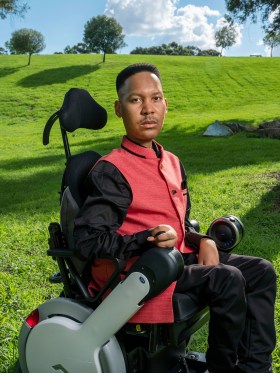
- Knowledge is power
- The Future Of Possible
- Hibs and Ross County fans on final
- Tip of the day: That man again
- Hibs and Ross County fans on final
- Spieth in danger of missing cut
Eddie Ndopu has a degree from Oxford, works for the U.N. — and plans to go to space
There can be irony in even the happiest of sentiments—a fact that is surely not lost on Eddie Ndopu. The son of a South African mother and a Namibian father, Ndopu was born in 1990, the year Namibia attained its independence from South Africa, and just four years before Nelson Mandela became South Africa’s first black President.
 Jonathan Torgovnik for TIME
Jonathan Torgovnik for TIME Ndopu and his demographic cohort in the southern part of Africa became known as the “born free” generation—a sentiment suited to a time and a place when apartheid and other old oppressions were being cast aside. But for Ndopu, freedom lasted only until he turned 2. It was then that he was diagnosed with spinal muscular atrophy (SMA), a degenerative condition that would weaken him, require the use of a wheelchair and kill him by age 5.
Except he didn’t die. Ndopu is now 29 and can look back with wonder at the path he’s traveled. “I have outlived myself by 25 years,” he marvels.
Read more of TIME’s Davos 2020 coverage
Like many people granted a span of years they did not expect to have—consider Stephen Hawking—Ndopu has made the most of his good fortune. He attended Oxford, graduating with a master’s degree in public policy. As a young, black, physically disabled man, as he describes himself, he campaigns for intersectional diversity and the rights of people who would in the past have been multiply oppressed. This year he was selected by the U.N. as one of 17 global ambassadors for its Sustainable Development Goals, an ambitious list of targets including eliminating poverty and hunger, ensuring gender equality, and providing clean water and sanitation, all across the globe.
One more thing: Ndopu is trying to go to space. “I defied the odds and challenges that faced me at birth,” he says, “and now it’s time to defy gravity.” He hopes to time his journey for the U.N. General Assembly in September 2020, and to address the international body while flying weightlessly above it. “I want to be able to use zero G as a stage,” Ndopu says. “If I have five minutes to talk to the world, what would I say to capture humanity’s attention?”
Perhaps it will be something like the mission statement of the global fund he’s established to encourage public-private investment to address the range of obstacles that prevent people with disabilities from fully participating in society. That includes such goals as making buildings and transit wheelchair accessible, improving technologies that enable those who can’t use a keyboard to engage with computers, and fostering job-training programs for the disabled. The fund has the backing of the U.N. and the World Economic Forum, and so far $40 million has been pledged, with a target of $100 million by 2020.
Ndopu’s plans to go to space will require a lot of collaboration and more than a few lucky breaks. He is in discussions with two aerospace companies (he can’t yet disclose which) racing to make commercial space travel available to anyone who can afford the six-figure ticket. The flights, if they happen, would be brief—just 15-minute suborbital lob shots. But they would cross the so-called Kármán line, a boundary generally accepted to be 100 km (62 miles) up, which earns a person astronaut wings. “I want to become the first disabled person in space,” he says. Traditionally, astronaut status has been reserved for the sublimely abled, and Ndopu’s flight could be a paradigm shift, a dramatic democratization of space travel.
The mission is by no means a sure thing, with technical hurdles being the biggest challenge. Private companies have been struggling for years to get the space-tourism business going, and while progress is being made, it’s quite slow—set back by a 2014 crash of a Virgin Galactic spacecraft, which killed one pilot and injured another.
In the event that the rockets aren’t ready to fly by Ndopu’s September target date, he will instead opt for a parabolic flight aboard a zero-G airplane, an ordinary jet that creates brief, repeated intervals of weightlessness as it swoops through a series of sine-wave-like arcs. If the timing for the flight does not coincide with the General Assembly—it could happen earlier, depending on aircraft availability—Ndopu will videotape his message to be shown when the U.N. does gather.
The altitude of a parabolic flight is nowhere near the Kármán line, and Ndopu will not earn any astronaut wings. But he will still broadcast to the General Assembly, and he will still float free from the wheelchair that typically confines him—a lyrical triumph of physics over physique, similar to the parabolic flight taken by Hawking in 2007, 11 years before his death.
Hawking inspired millions with his flight, and Ndopu hopes to do the same. “I often say I am a kaleidoscope of identities and experiences,” he says. “I think my story resonates with a cross section of society.”
TIME’s Davos 2020 issue was produced in partnership with the World Economic Forum.



Hi, this is a comment.
To get started with moderating, editing, and deleting comments, please visit the Comments screen in the dashboard.